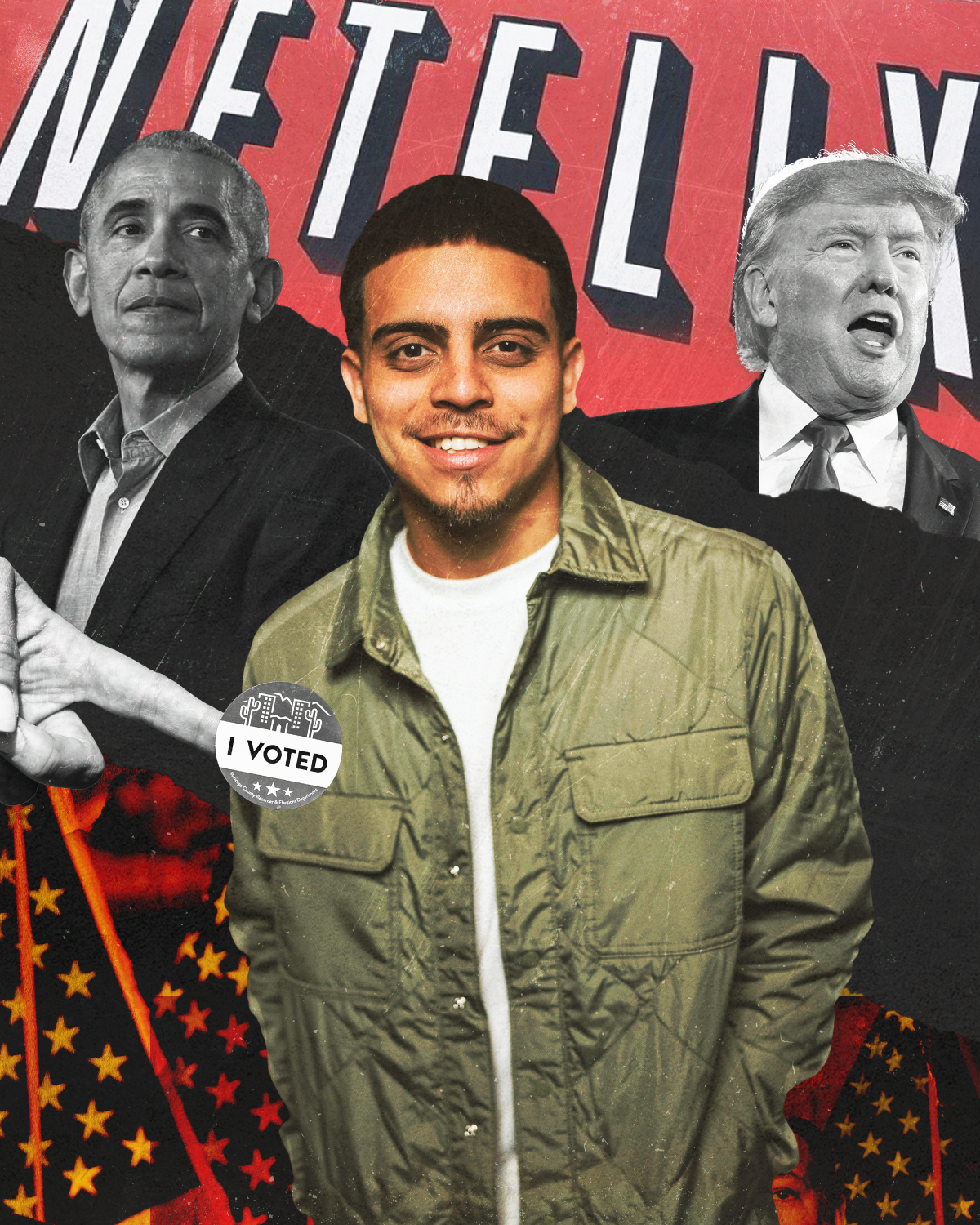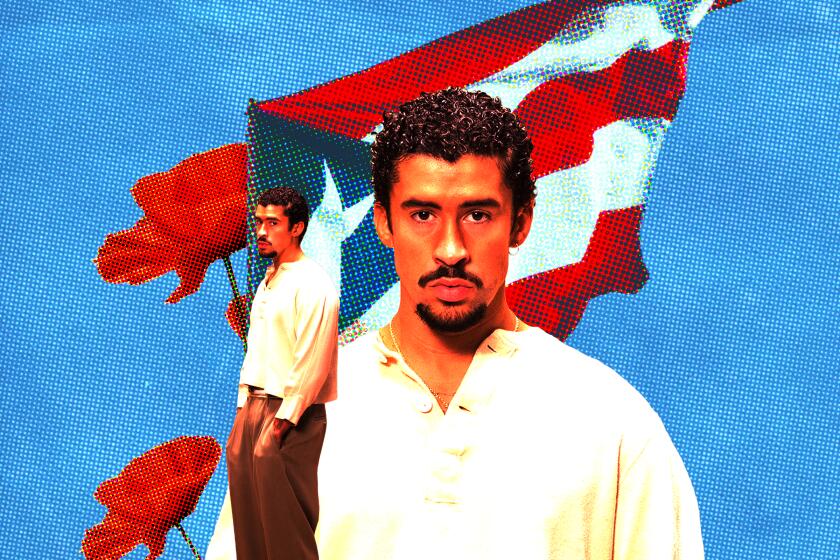Commentary: How Ralph Barbosa’s comedy explains Latino voters

Periodically, the Latinx Files newsletter will feature guest writers. This week, Aaron E. Sánchez will be filling in. Sánchez is a Texas-based writer who focuses on issues of race, politics and popular culture from a Latino perspective. He is the author of Homeland: Ethnic Mexican Belonging Since 1900 and is currently working on a book of creative nonfiction essays.
With the coming of yet another election cycle, confusion and head-scratching about the “Latino vote” has already begun.
While Latinos are thankfully no longer referred to as the “sleeping giant,” many outsiders still don’t recognize the differences that exist within a community composed of groups as diverse as Hispanos in northern New Mexico, Mexican Americans in Chicago or Puerto Ricans in central Florida. Questions about whether Latinos are conservative or liberal continue to confuse parachute journalists and pollsters alike. What is often missing in these discussions is that Latino voters don’t necessarily understand political divisions in the same way as white Americans do.
Watch “Cowabunga,” the latest Netflix comedy special by Dallas-based comedian Ralph Barbosa, to understand how Latinos think about politics.
If Barbosa’s name rings a bell, it’s likely that you “memmer” him from earlier this year, when George Lopez dismissed the young up-and-coming comic in a podcast. Curiously, you can see their generational politics in their stand-up routines. While Lopez’s observations have become crankier, Barbosa mines the contradictions for comedy gold.
In one bit, after spending time in New York, Barbosa wonders whether the open-carry policies of his home state of Texas do indeed offer “checks and balances” to police forces. This led him to a worrisome question that garnered great applause from the crowd: “Am I a Republican?”
In an instant, Barbosa seems to confirm a political axiom of Lionel Sosa, the longtime Republican political consultant who once quipped to President Reagan that “Hispanics are Republicans; they just don’t know it yet.”
Indeed, the 2020 election and more recent polling seem to indicate that Barbosa and those like him are shifting right.
But Barbosa quickly dispels that idea, telling his audience that “these are just jokes.” In case it wasn’t clear, he stops the show a few minutes later to remind the audience that he is definitely not a Latino Republican. When the crowd responds to his statement with an uproar, he once again interjects.
“Don’t clap,” Barbosa says. “I’m not you [Democrats] either.”
This, too, is true of Latino voters.
You’re reading Latinx Files
Fidel Martinez delves into the latest stories that capture the multitudes within the American Latinx community.
You may occasionally receive promotional content from the Los Angeles Times.
Latino voters do not have partisan loyalties. Republican political strategist Leslie Sánchez noted this in the early 2000s when she found that while their views might skew conservative, they did not necessarily vote Republican.
The same can be said about the other side. More recently in Texas, where strategists have long believed that the growing Latino population would turn the state “blue,” reports have shown that young Latinos have not developed strong loyalties to Democrats. In one of the most comprehensive reports on the demographic, the Jolt Initiative found that only 13% of Latinos favored the Republican Party; 32% preferred the Democratic Party; and, crucially, 34% were unsure about which party they were most affiliated with. When combined with independents, 50% of Latino voters did not affiliate with either party in the second most populous state in the country.
Why would someone like Barbosa feel so out of place in either party?
Modern-day Republican Latino outreach began after President Nixon’s “Southern Strategy” intentionally jettisoned Black Republican voters to gain “racially anxious” white voters. Party leaders like George H.W. Bush believed they could offset these losses with small gains in the Latino electorate. It was within this racialized political calculus that the institutional structure took shape. Republicans did not need to win the majority of Latino voters; they only needed to win enough away from Democrats to make the race competitive.
Similarly, Democratic outreach based on get-out-the-vote campaigns in Black communities haven’t necessarily worked with Latino communities. Efforts like Souls to the Polls work well with older, established populations with long histories of voting and civic engagement. On young, first-generation, religiously unaffiliated voters? Not so much.
Moreover, both parties’ recent outreach efforts have fallen short in explaining their positions and impacts on the lives of a population that skews younger than the average U.S. population. Both parties tend to emphasize immigration. Yet in the 2022 election, immigration was the ninth most important issue to Latino voters — the economy and education are more critical.
Organizations like the libertarian-leaning Koch-backed Libre also often overplay the anti-statist sentiments of Latinos. While many Latinos and immigrants are wary of government and taxation, they have also seen the problems of a government that does not do enough or doesn’t work at all. Even Latino evangelicals, who consider themselves more ideologically conservative (39%), still lean Democratic (41%).
Consider subscribing to the Los Angeles Times
Your support helps us deliver the news that matters most. Become a subscriber.
At 27, Barbosa reflects the U.S.-born Latino population — their median age is 21. He also comes from an intergenerational, mixed-status family (nearly a third of Latino families in the U.S. are mixed-status).
And, just as crucially, he’s never voted.
“I was raised by my grandma,” Barbosa explains. “She had just got to this country. She’s not going to encourage me to vote. She was just like, ‘Don’t touch nothing. Let’s just be happy to be here.’”
Latinos vote at lower rates than other groups. Barbosa explains that he shouldn’t be judged for not voting because his family lacked political literacy. His mother had him when she was 16 years old and his grandmother, who raised him, was an immigrant. His family was busy making ends meet. Latino political strategists Mike Madrid and Chuck Rocha have repeatedly faulted both parties on their inability to address or even articulate the needs of working-class Latino families.
Barbosa’s perceptions of the parties’ platforms don’t align with his understanding of how the world works, but that doesn’t mean he doesn’t care about the issues affecting his family and his communities. He’s willing to hear what each party has to say, if they care to speak to him.
He closes his bit on politics on a hopeful note.
“I’ll vote eventually,” he says.
“I’m not like, ‘Yo, I’ll never vote.’ No, I’ll vote eventually. And I also don’t judge anybody’s political preferences…” Adding, “Well, there’s like one group of people, one small group that I do judge a little bit. And I’m not even saying they’re wrong. I just judge them a little bit. And it is: Latino Republicans.”

Things we read this week that we think you should read
From De Los:
Decluttering your parents’ home and their traumas
How do you compassionately get rid of the things your immigrant parents hold on to that are piling up in their home? Column by regular contributor Alex Zaragoza.
Maria Martin, the force behind ‘Latino USA,’ dies at 72
Radio trailblazer Maria Martin died Saturday at age 72 after a recent operation. Her career included mentoring journalists at NPR and in Central America.
15 Latinx-owned places to shop this holiday season in L.A.
Whether you’re looking for self-care essentials, indoor plants or records for the collectors in your life, we’ve got ideas to help you shop small across L.A. County.
Melissa Barrera showed solidarity with Palestinians. Hollywood showed its persistent double standard
Barrera’s firing is a sad reminder of how historically marginalized groups, like Latinas, are forced to walk a tightrope when advocating for social causes, and of how fragile “representation” is in Hollywood. Column by regular contributor JP Brammer.
From the L.A. Times:
Inside the last porn theater in Los Angeles
The last adult film theater in Los Angeles is run by a Salvadoran immigrant and former battlefield nurse. Patrons call the Tiki Theater “a refuge.”
L.A.’s rodeo ban stirs a cultural backlash. The city still moves to crack down — with these exceptions
The Los Angeles City Council has approved an amendment meant to assuage concerns that a rodeo ban would unfairly block equestrian events of cultural significance.
Why do California, Texas differ so much? Religion, priorities of white minority play huge roles, poll shows
Average Texans and Californians agree a lot more than their states’ policies would suggest, even on issues like abortion and guns. Each tips slightly in one direction, but politics magnify the differences.
Leaked document offers glimpse into how Amazon amasses influence in the Inland Empire
A leaked document shows how Amazon cultivates support from nonprofits and politicians in its fight against environmental regulations and labor organizers in the Inland Empire.
The Latinx experience chronicled
Get the Latinx Files newsletter for stories that capture the multitudes within our communities.
You may occasionally receive promotional content from the Los Angeles Times.



